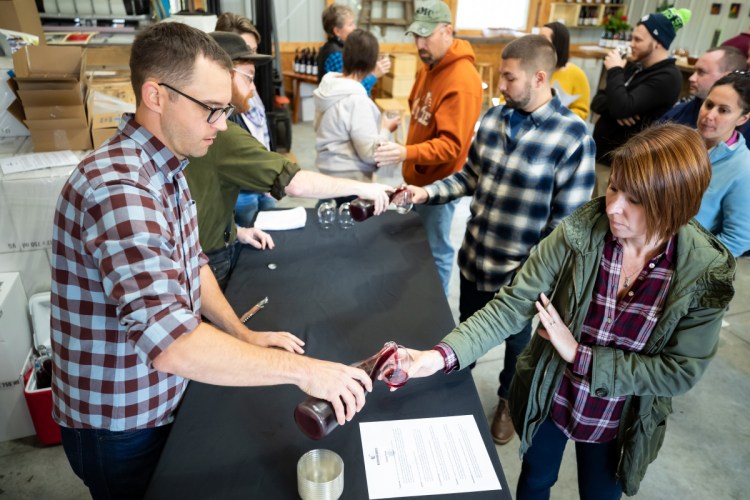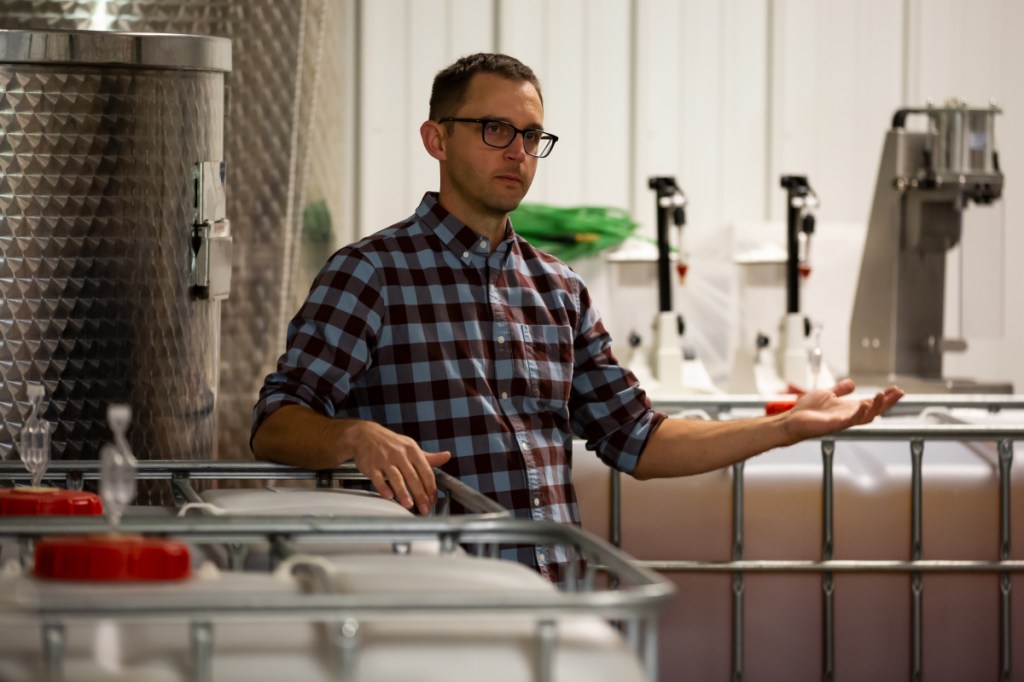WINTHROP — Fall in Maine means a boundless bounty of apples. Brisk fall days may lend themselves to warm cider donuts or apple pie fresh out of the oven — or maybe something that warms you up in a different way.
Kennebec Cider Company, on Case Road in Winthrop, held their third annual Ciderfest on Saturday, rolling out two limited edition ciders.
The festival offered event-goers the opportunity to walk around their orchard, enjoy craft hard ciders and see how the product is made. Events later in the day included donut-eating contests and pumpkin painting for families and live music by Winthrop’s Seth Pilsbury, while barbecue was served by Lewiston’s Fahrenheit 225 food truck.
Husband and wife duo Nathan and Megan Hall took over the company three and a half years ago, almost immediately planning the first iteration of this event. The company was founded in 2009, by friends of the Hall family, Ben and Betsy Parks-Stamm. Megan, a marketer, and Nathan, an artist and house painter, decided to take over the operations when the burden got too great for the previous owners.
Nathan Hall said the Ciderfest event attracts people from as far away as Massachusetts — and Mainers who weren’t aware of their business — and attendance has grown steadily.
“We have had great response and great weather,” he said. “The foliage and the bright sunny days; it’s been a great way to get the local people (here).”
It’s no secret that Maine’s craft beer industry is growing — beer lovers visited Maine’s more than 130 breweries at a highest rate than ever before this summer. According to the CiderGuide.com, a directory of cideries in North America, there are about 15 cideries in the state. Hall said there was quick spurt of growth in hard cideries in Maine, but growth has since tapered off.
“It felt like it was growing and there was a new one every few months, (then it) sort of plateaued a little bit,” Hall said. “The local liquor store doesn’t just have Angry Orchard and Woodchuck; there’s a lot of smaller cideries in Maine.”
Megan Hall said there are 200 apple trees on their property, but thats only one-sixth of the apples they need to create the quantity needed to fulfill their orders. They commission nearby farms, like Manchester’s Lakeside Orchard, for apples to help fill the need and even get fruit from neighbors when they can.
The Hall’s pride themselves on a few unique blends of cider with fruits they grow on their property, like blueberry. Nathan Hall said about 10 percent of the juice used in the cider comes from crabapples, which are usually too sour to consume.
“The more disgusting the apple is, I know it’s going to make good cider,” Nathan Hall told a group of attendee while showing them the orchard. “It’ll translate into a tart, dry cider.”

Megan Hall, left, listens as Nathan Hall, right, explains a flavor of cider prior to the start of the third annual Ciderfest at Kennebec Cider Company in Winthrop on Saturday.
Megan Hall said the company’s cider is more dry than sweet, but the company has something for everyone’s palate. Nathan Hall likened it to wine, rather than beer, explaining that he uses sulfites, commonly found in wine, and “champagne yeast” to make the cider.
“We’re more on the wine scale,” he said during the tour of the orchard,” he said. “We could call it 2018 vintage.”
Attendees who paid for VIP tickets were treated to five ciders during a pre-festival tasting. The offerings included the company’s traditional blend and sweet blueberry and raspberry ciders.
Two stars of the tasting were limited edition flavor using unique fruits. The first being quince — a pear-like fruit that is generally not eaten raw because it tastes bad, rather made into a paste with lemon and sugar. The Halls have a quince tree on their property and use about 20 percent quince juice in the limited edition cider.
“It’s a very tart, bitter fruit,” Nathan Hall said. “It’s a unique fruit to the state, it grows well in cold climates.”
Tasters had gave positive feedback after the tasting. Briana Dyer, of Sebec, attending the tasting with her daughter Blake, said she enjoyed all of the ciders but she preferred the sweeter raspberry offering, while her daughter enjoyed the distinctly tart quince cider.

Quince, a fruit similar to a pear, appears in the left side of this frame and is used in a limited edition cider at Kennebec Cider Company’s third annual Ciderfest held on Saturday in Winthrop. In the background appears part of the brewing building and a food truck on site.
“Even what they’re calling sweet isn’t even that sweet compared to other ciders,” Briana Dyer said. “I’ve never been to a tasting room before, so this is nice.”
“I don’t really like sweet drinks, so the tartness (of the quince) was better,” Blake Dyer said. “It was more wine-y, I think.”
Another blend that was released at the Ciderfest was a cider using red-fleshed apples called “Pomme Rouge.” Red-fleshed apples come in as many flavor profiles as white-flesh apples, but their color makes for a novel eating — or in this case, drinking — experience.
Winthrop has history of breeding red-fleshed apples; Morris Towles birthed the “Winekist” in the early 1900s. The Winekist is a medium-sized tart apple that has a deep-red skin and beet-red flesh, according to the Maine Organic Farmers and Gardeners Association. A number of these apples and some red-fleshed crabapples from a nearby friend were used in making Pomme Rouge.
Kennebec Cider Company has a tasting room, but it is open by appointment only. For booking information, visit their website, kennebecciderco.com.
The company’s cider, only sold in Maine at this point, is for sale at about 60 locations.
Sam Shepherd — 621-5666
Twitter: @SamShepME
Send questions/comments to the editors.




